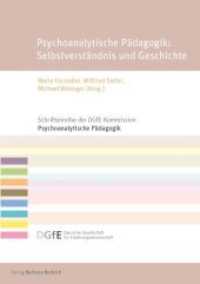Full Description
This volume examines how universities and colleges around the world are developing innovative ways to provide doctoral education, including new theories and models of doctoral education and the impact of changes in government and/or accreditation policy on practices in doctoral education. Specifically, this volume looks at the emerging trends in student selection practices, research topic selection, supervision practices, and dissertation review and approval process across a range of disciplines across different institutional types across different countries. Seeking to understand the current landscape of how universities are preparing the next generation of researchers, scholars, scientists, and university faculty, Emerging Directions in Doctoral Education is a must-read for faculty, researchers, accreditation agencies, doctoral students and policymakers.
Contents
PART I: CONCEPTS AND PRINCIPLES
Innovative Approaches in Doctoral Education: An Introduction to Emerging Directions in Doctoral Education - Patrick Blessinger and Denise Stockley
Doctoral Education for the Future: Through the Looking Glass - Gerard Hoyne, Julia Alessandrini and Marc Fellman
Scholar-in-Training; Leader-in-Training: The Rutgers University PreDoctoral Leadership Development Institute - Ralph A. Gigliotti, Brian D. Agnew, Christine Goldthwaite, Surabhi Sahay, Maria Dwyer and Brent D. Ruben
Managing the Psychological Contract within Doctoral Supervisory Relationships - Sally Sambrook
PART II: SUCCESSFUL PRACTICES
Disciplinarity Issues in Educational Technology Doctoral Supervision - Gale Parchoma and Jeffrey M. Keefer
Living Theory in Action: Preparing a New Generation of Educational Researchers - Karen L. Ford, Elena Yu. Polush and Nancy J. Brooks
Creating a Decolonized Alliance: American Indian and Alaska Native Doctoral Leadership Program - Kem M. Gambrell and Lazarina N. Topuzova
Collision and Coalescence - German and British Cultures in Doctoral Education - Wolfgang Deicke, Johannes Moes and Johannes Siemens
Client-Based Dissertations in Practice - Kathleen M. Haywood, Kimberly R. Allen and Felicita A. Myers
Learning like Adults: A Hybrid Interdisciplinary Doctoral Program for Mid-Career Professionals - Judith Beth Cohen, Jo Ann Gammel and Amy Rutstein-Riley
Applying Self-Determination Theory to Improve Completion Rates in a Part-time Professional Doctorate Program - Grace McCarthy
Differentiation and Integration: Managing the Paradox in Doctoral Education - Jon F. Wergin and Laurien Alexandre
Qualified ... for What? The Potential for Qualifying Exams to Become Meaningful Professional Milestones - Jessica L. Riviere
Joint Doctoral Supervision across Countries: Changes, Challenges and Considerations - Elise van den Hoven and Julia Connell
Developing Institutional Leadership for the Scholarship of Graduate Student Supervision: Lessons Learned in a Canadian Research-Intensive University - Anthony Clarke, Harry Hubball and Andrea Webb








